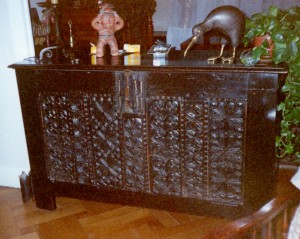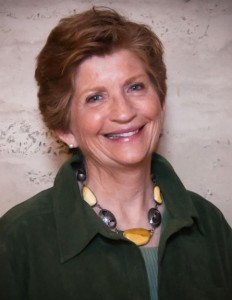 I inherited an apartment full of antiques … plus everything else … in Nice, France.
I inherited an apartment full of antiques … plus everything else … in Nice, France.
What was supposed to be a gift has become a burden, considering I have to pay 60% French inheritance taxes on everything. You see, Aunt Elisabeth and I were not blood relatives, so I’m taxed to the maximum by French law. That means that anything I don’t sell, I not only have to pay 60% tax on, but I also have to pay to ship it back to the States.
So I picked out one piece of furniture: a dark, almost black, wooden chest I’ve admired for 30 years, each time I sat in Elisabeth’s living room. Richly carved with an unusual metal locking mechanism, it must have come from one of their North African trips.
Over the years, Elisabeth would say, “When I’m gone, I imagine you’ll just get rid of everything…” I’d reassure her, “Oh, no, there are several things I’ll want to keep, of course.” But the truth is, other than the chest and some paintings I dearly love, the rest will go to auction and move on to the homes of people who didn’t know her. What she accumulated over her life, and treasured, will be dispersed in an anonymous way, just as she herself bought those that are antiques: through auction.
As the time approaches to have the auction house come empty the apartment and for me to coordinate the packing and shipping of the chest, I thumbed back through the photos I had taken last time I was in her apartment. I kept going back to her antique desk and chair. She sat there so many hours, running her businesses and her real estate deals, doing her accounts and typing letters to attorneys related to her latest lawsuit … on her manual Smith Corona. Making carbon paper copies.
I struggled with the thought of putting her desk and chair in the auction with the rest of the beautiful things she took so much pride in. Too much emotion, too much energy, too many memories.
Then I stopped myself. I don’t even like the style of the desk. Or the color of the wood. What I love is what it represents.
It made me think about how we accumulate stuff.
I thought about my Aunt Pat’s purple steamer trunk in the corner of my dining room that’s filled with things someone thought I’d like after she died. It’s still sitting there, unopened. Four years later. And I remembered that when my friend Sarah’s mother Esther died here in Miami, there were lots of things Sarah couldn’t take back to France. So she brought them all to my house. After all, I loved her mother so they’d be going to a good home.
Those boxes of Esther’s things wouldn’t fit anywhere, so they went into the guest bedroom. Temporarily, of course. And like anything else you put in the middle of a room, on the floor, it mysteriously grows. More and more boxes, a piece of furniture here, a case of books there. And last week I realized I could no longer move 3 feet into the bedroom without climbing over something … forget finding the bed. The door has been kept closed for over a year because I didn’t want anyone to see what’s in there.
And I certainly can’t have any guests come and stay, because the guestroom is unusable.
For a week or two, I’ve been mulling over the whole concept of “inheriting” things from other people. Things that may not be our taste, but things we keep to honor the memory of the person who once owned them.
I thought again about Elisabeth’s desk. And then I remembered a desk I own that dates back to 1640, when the Dutch invaded the north of Brazil. I’ve moved that desk from continent to continent, Brazil to U.S., U.S. to Europe back and forth two or three times. I love that desk. And I have no room for it in my little house, so it’s stored somewhere.
Why would I pay 60% to keep Elisabeth’s desk, plus pay to ship it here, when a desk I truly love is sitting in someone’s garage?
Why do we feel we have to hold on to things that someone else owned, after they’re gone? What kind of mystical powers are imbued in their “stuff” that make us add it to our own and trip over it for years? Especially antiques that have been owned and loved by others over the ages, maybe even strangers.
Yesterday, I was walking with my friend Elena as I do each morning. I mentioned my desk dilemma to her. She said, “Sharon, when you die, what’s going to happen to all the lovely things you’ve accumulated over the years in your worldly travels?” I answered, “Well, there are some pieces my brothers and sister might want because they’re family things. But the rest? Who knows?”
She went on, “And if they’ve all died before you do? After all, you’re the youngest …”
After a moment, I said, “Someone will come and sort through everything, maybe hold a piece or two. And the rest will be dispersed anonymously.”
Suddenly I realized that we spend our lives collecting things, caring for them, maintaining them, cherishing them, and putting locks on our doors to keep them safe. And then, one day, we die and those things become a burden to someone else.
I’ve just taken one more step towards rebuffing the power “things” have over me. I’ve now been shown that we just “borrow” the things that are in our possession. If they bring us joy, fine. But realize: they’re borrowed.
Tomorrow the Vietnam Vets’ truck is coming to pick up what had “grown” in the guest bedroom. And, after my conversation with my friend Elena, the volume of what they are picking up doubled.
After all, it’s all “stuff.”
So what are you tripping over?
xxxxxxx
 Sharon O’Day is an expert in global finance and marketing with an MBA from the Wharton School. She has worked with governments, corporations, and individuals … yes, she was the secret ‘weapon,’ if you will, behind many individuals in high places. At age 53, she lost everything: her home, her business, everything. Since then, Sharon has interviewed women and done extensive research to understand how that could have happened, especially with her strong knowledge of numbers and finance.
Sharon O’Day is an expert in global finance and marketing with an MBA from the Wharton School. She has worked with governments, corporations, and individuals … yes, she was the secret ‘weapon,’ if you will, behind many individuals in high places. At age 53, she lost everything: her home, her business, everything. Since then, Sharon has interviewed women and done extensive research to understand how that could have happened, especially with her strong knowledge of numbers and finance.
The surprising answers will be shared in her upcoming book “Money After Menopause.” Today her focus is to show women how to reach financial security for the long term. She has developed a step-by-step plan to get past all the obstacles that keep women broke and scared … and from reaching the financial peace of mind they so deserve.





